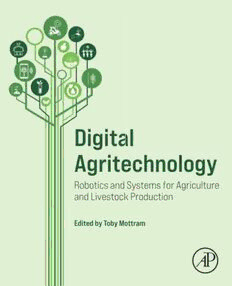
Digital Agritechnology: Robotics and Systems for Agriculture and Livestock Production PDF
Preview Digital Agritechnology: Robotics and Systems for Agriculture and Livestock Production
Digital Agritechnology This page intentionally left blank Digital Agritechnology Robotics and Systems for Agriculture and Livestock Production Edited by Dr Toby Mottram FREng, FIAgrE Douglas Bomford Trust Chair of Farm Mechanisation, Royal Agricultural University, Cirencester, United Kingdom AcademicPressisanimprintofElsevier 125LondonWall,LondonEC2Y5AS,UnitedKingdom 525BStreet,Suite1650,SanDiego,CA92101,UnitedStates 50HampshireStreet,5thFloor,Cambridge,MA02139,UnitedStates TheBoulevard,LangfordLane,Kidlington,OxfordOX51GB,UnitedKingdom Copyright©2022ElsevierInc.Allrightsreserved. Nopartofthispublicationmaybereproducedortransmittedinanyformorbyanymeans, electronicormechanical,includingphotocopying,recording,oranyinformationstorageand retrievalsystem,withoutpermissioninwritingfromthepublisher.Detailsonhowtoseek permission,furtherinformationaboutthePublisher’spermissionspoliciesandour arrangementswithorganizationssuchastheCopyrightClearanceCenterandtheCopyright LicensingAgency,canbefoundatourwebsite:www.elsevier.com/permissions. Thisbookandtheindividualcontributionscontainedinitareprotectedundercopyrightby thePublisher(otherthanasmaybenotedherein). Notices Knowledgeandbestpracticeinthisfieldareconstantlychanging.Asnewresearchand experiencebroadenourunderstanding,changesinresearchmethods,professionalpractices, ormedicaltreatmentmaybecomenecessary. Practitionersandresearchersmustalwaysrelyontheirownexperienceandknowledgein evaluatingandusinganyinformation,methods,compounds,orexperimentsdescribed herein.Inusingsuchinformationormethodstheyshouldbemindfuloftheirownsafetyand thesafetyofothers,includingpartiesforwhomtheyhaveaprofessionalresponsibility. Tothefullestextentofthelaw,neitherthePublishernortheauthors,contributors,oreditors, assumeanyliabilityforanyinjuryand/ordamagetopersonsorpropertyasamatterof productsliability,negligenceorotherwise,orfromanyuseoroperationofanymethods, products,instructions,orideascontainedinthematerialherein. ISBN:978-0-12-817634-4 ForinformationonallAcademicPresspublicationsvisitour websiteathttps://www.elsevier.com/books-and-journals Publisher:NikkiLevy AcquisitionsEditor:AnnaValutkevich EditorialProjectManager:LindsayLawrence ProductionProjectManager:PaulPrasadChandramohan CoverDesigner:MarkRogers TypesetbyTNQTechnologies This book is dedicated to Dr David Llywelyn Smith, an extraordinary skilledengineer,myPhDtutor,lifelongfriendandChairmanofeCow. He read the first draft of Chapter Six for me before his untimely death in 2021. This page intentionally left blank Contents List ofcontributors.................................................................................xv Aboutthe editor...................................................................................xvii Foreword..............................................................................................xix Preface................................................................................................xxi CHAPTER 1 An introduction to digital agritechnology.................1 Toby Mottram Background............................................................................1 First agricultural revolution(1700 onwards).............................1 Second agricultural revolution(1914e1980s)...........................2 Third agricultural revolution (1920sepresent)...........................3 Fourth agricultural revolution(1970s onwards).........................3 Basic technologies for digitalagritechnology................................4 Microchips.........................................................................4 Electronic identification (EID orRFID)...................................5 Silicon sensors....................................................................5 Global positioning systems....................................................5 Meteorological information...................................................5 Digital imaging...................................................................6 Communications systems......................................................6 Internet protocols.................................................................6 Databases...........................................................................6 Howthis bookis organised.......................................................7 References..............................................................................9 CHAPTER 2 From data to information........................................11 PaulLynham Introduction...........................................................................11 The future.............................................................................12 Whydata?.............................................................................13 Data in context.......................................................................14 DIKW model.....................................................................14 Applications......................................................................15 Data representation.................................................................16 Data encoding........................................................................17 Number bases........................................................................18 Characterencoding.................................................................18 Data types.............................................................................19 Primitiveor simple data types...............................................20 vii viii Contents Complexorcomposite data types..........................................23 Datavalidationand verification.................................................26 Data operations......................................................................28 Data processing......................................................................28 Data storage...........................................................................28 Devices.............................................................................29 Theinternet ofthings..........................................................29 Thecloudand data centres...................................................30 Files-based systems.............................................................30 Databases..........................................................................31 Enterprise service bus..........................................................32 Data compression...............................................................32 Data transmission...................................................................33 Theinternet.......................................................................33 Theworldwideweb............................................................34 Services............................................................................35 Application programminginterface........................................35 Data formats andmessaging.................................................36 Rendering..............................................................................36 Transformations..................................................................37 Web scraping.....................................................................37 Datavisualisation...............................................................38 Data classification...................................................................39 Data management...................................................................40 Security................................................................................41 Attackers...........................................................................41 Threat modelling................................................................41 CIA triad...........................................................................41 Regulation.........................................................................43 Politics.............................................................................43 Data trends............................................................................43 Challenges.............................................................................44 References.............................................................................45 CHAPTER 3 ISOBUS e standards and uses for data from farm machinery.............................................................49 Norbert Schlingmann Introduction...........................................................................49 Short history ofISOBUS.........................................................49 ISO 11783based onCAN bus..............................................50 Components and network.........................................................52 Contents ix ISOBUS system overview....................................................52 Connectors........................................................................52 ISOBUS functionalities............................................................54 UniversalTerminal (UT)......................................................55 Auxiliary Controls (AUX-O and AUX-N)...............................55 Task Controller (TC)...........................................................56 Tractor ECU (TECU)..........................................................56 Tractor ImplementManagement (TIM)..................................57 ISOBUS Shortcut button (ISB).................................................57 File Server(FS)......................................................................59 Compatibility between ISOBUS systems....................................59 Conformance Testing and Certification toguarantee compatibility......................................................................59 AEF recognised test laboratories...............................................60 AEF ISOBUS Database...........................................................60 AEF Plugfest.........................................................................62 Future developmentson ISOBUS..............................................63 High-Speed ISOBUS (HSI) includingfuture network architecture........................................................................63 WirelessIn-field communication (WIC)..................................64 Connectivity between platforms............................................66 CHAPTER 4 Field robotics for harvesting...................................69 Josie Hughes, Fumiya LidaandSimon Andrew Birrell Introduction...........................................................................69 Field robotics for harvesting.................................................69 Achieving impact:faster,cheaper and safer harvesting..............71 The reality of harvesting..........................................................72 Challenges.........................................................................72 Current state ofthe art.............................................................73 Mechanisms andmanipulation..............................................74 Vision andlearning.............................................................75 Field tests and measuring success..........................................79 Translation from researchto commercialisation...........................80 Case studies...........................................................................82 Vegebot:iceberglettuce harvesting........................................82 The future.............................................................................86 Future technologies.............................................................86 New approaches toharvesting...............................................87 Acknowledgements.................................................................89 References.............................................................................89
